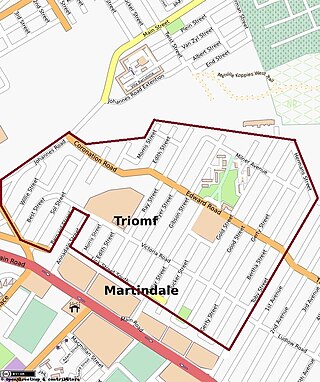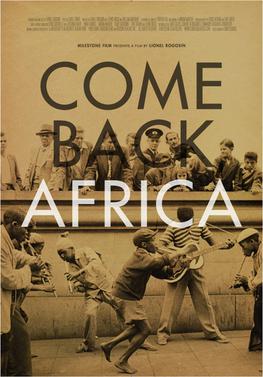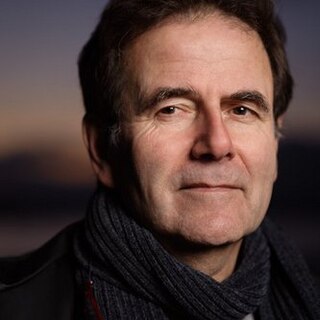Michael Raeburn | |
|---|---|
 | |
| Born | 22 January 1943 or 1948 Cairo, Egypt |
| Nationality | Zimbabwean |
| Alma mater | University of Rhodesia,London |
| Occupation | Filmmaker |
Michael Raeburn (22 January 1943 [1] or 1948 [2] ) is a Zimbabwean filmmaker.
Michael Raeburn | |
|---|---|
 | |
| Born | 22 January 1943 or 1948 Cairo, Egypt |
| Nationality | Zimbabwean |
| Alma mater | University of Rhodesia,London |
| Occupation | Filmmaker |
Michael Raeburn (22 January 1943 [1] or 1948 [2] ) is a Zimbabwean filmmaker.
Raeburn's mother was partly Egyptian and his father was British. [3] Born in Cairo, Egypt, Raeburn lived in Rhodesia from the age of three. He studied at the University of Rhodesia, University of London and University of Aix-en-Provence.
After making his satirical 1969 film Rhodesia Countdown (Directors' Fortnight Cannes), he was declared a prohibited immigrant in Rhodesia, and spent twelve years in exile. [4]
Living in London, Raeburn met James Baldwin in 1974. The pair became friends, and on-off lovers, and in 1977 began working together on a movie adaptation of Giovanni's Room . [5] Marlon Brando agreed to play the part of Guillaume, and Robert De Niro also showed interest in the project. At Baldwin's 53rd birthday in 1977, guests were told that the film was going to be made. However, Raeburn eventually gave up the project, frustrated at financial demands made by Baldwin's agent. [6] [7]

Zimbabwean music is heavily reliant on the use of instruments such as the mbira, Ngoma drums and hosho. Their music symbolizes much more than a simple rhythm, as the folk and pop style styled music was used as a symbol of hope for Zimbabweans looking to gain independence from Rhodesia. Music has played a significant role in the history of Zimbabwe, from a vital role in the traditional Bira ceremony used to call on ancestral spirits, to protest songs during the struggle for independence. The community in Zimbabwe used music to voice their resistance to their oppression, as one of the only weapons they had available to fight back with. In the eighties, the Music of Zimbabwe was at the center of the African Music scene thanks to genres such as Sungura and Jit. However, several performers were banned by state TV and radio leading to the closing of several music venues.

Oliver "Tuku" Mtukudzi was a Zimbabwean musician, businessman, philanthropist, human rights activist and UNICEF Goodwill Ambassador for Southern Africa Region.

Sophiatown, also known as Sof'town or Kofifi, is a suburb of Johannesburg, South Africa. Sophiatown was a poor multi-racial area and a black cultural hub that was destroyed under apartheid. It produced some of South Africa's most famous writers, musicians, politicians and artists, like Father Huddleston, Can Themba, Bloke Modisane, Es'kia Mphahlele, Arthur Maimane, Todd Matshikiza, Nat Nakasa, Casey Motsisi, Dugmore Boetie, and Lewis Nkosi.

African popular music, like African traditional music, is vast and varied. Most contemporary genres of African popular music build on cross-pollination with Western popular music. Many genres of popular music like blues, jazz, salsa, zouk, and rumba derive to varying degrees on musical traditions from Africa, taken to the Americas by enslaved Africans. These rhythms and sounds have subsequently been adapted by newer genres like rock, and rhythm and blues. Likewise, African popular music has adopted elements, particularly the musical instruments and recording studio techniques of the Western music industry. The term does not refer to a specific style or sound but is used as a general term for African popular music.

Euzhan Palcy is a French film director, screenwriter, and producer. Her films are known to explore themes of race, gender, and politics, with an emphasis on the perpetuated effects of colonialism. Palcy's first feature film Sugar Cane Alley received numerous awards, including the César Award for Best First Feature Film. With A Dry White Season (1989), she became the first black female director to have a film produced by a major Hollywood studio, MGM.
White Zimbabweans, also known as Rhodesians, are Zimbabwean people of European descend. In linguistic, cultural, and historical terms, these Zimbabweans of European ethnic origin are mostly English-speaking descendants of British settlers. A small minority are either Afrikaans-speaking descendants of Afrikaners from South Africa or those descended from Greek, Portuguese, Italian, and Jewish immigrants.
David Bailie was a South African actor known for his performances on stage, television, and film. In the 1960s and 1970s, he worked for both the National Theatre and the Royal Shakespeare Company, where he was an associate artist. He played "Dask" in the 1977 Doctor Who serial The Robots of Death and also appeared in Blake's 7.

Charles Tonderai Mudede is a Zimbabwean-American writer, filmmaker, and leftwing cultural critic. Though born in Kwekwe, he spent much of his childhood in the United States, and returned to Zimbabwe shortly after independence. Between 1982 and 1988, his mother, Tracy Mudede, was a lecturer at the University of Zimbabwe, and his father, Ebenezer Mudede, was an economist for the Zimbabwe government. Between 1990 and 2001, his father worked as an economist for the Botswana government and his mother lectured at the University of Botswana. In 1989, he moved to the US to study literature, art history, and political philosophy. His parents moved to the US from Botswana in 2002 for medical reasons. The Mudedes are Manicas and were once close to Bishop Abel Tendekayi Muzorewa, the prime minister of the short-lived coalition government called Zimbabwe Rhodesia (1979–1980).

Come Back, Africa is a 1959 film, the second feature-length film written, produced, and directed by American independent filmmaker Lionel Rogosin. The film had a profound effect on African cinema, and remains historically and cultural importance as a document preserving the heritage of the townships in South Africa in the 1950s. It may be classified as reportage, documentary, historical movie or political cinema, since it portrays real events and people. It reveals an interpretation of meaningful social facts and a strong ethical assumption towards human behaviours like racism.

There is a wide range of ways in which people have represented apartheid in popular culture. During (1948–1994) and following the apartheid era in South Africa, apartheid has been referenced in many books, films, and other forms of art and literature.

Docufiction is the cinematographic combination of documentary and fiction, this term often meaning narrative film. It is a film genre which attempts to capture reality such as it is and which simultaneously introduces unreal elements or fictional situations in narrative in order to strengthen the representation of reality using some kind of artistic expression.

The 22nd Cannes Film Festival was held from 8 to 23 May 1969. At this festival a new non-competitive section called Directors' Fortnight was added, in response to the cancellation of the 1968 festival.
Bernard Thomas Gibson Chidzero was a Zimbabwean economist, politician, and writer. He served as the independent Zimbabwe's second finance minister.

Mark Kidel is a documentary filmmaker, writer and critic, working mostly in France and the UK.
His award-winning films include portraits of Cary Grant, John Adams (composer), Elvis Costello, Boy George, Ravi Shankar, Rod Stewart, Bill Viola, Iannis Xenakis, pianists Alfred Brendel and Leon Fleisher, Derek Jarman, Brian Clarke Balthus, Tricky, Robert Wyatt and American theatre and opera director Peter Sellars.
Jit is a Zimbabwean film made in 1990, written and directed by Michael Raeburn. It is about a young man, nicknamed UK, who lives in Harare with his musician uncle, Oliver Mtukudzi, who plays himself. UK is knocked out when he falls out of a taxicab and then falls in love with the woman he gazes up at when he regains consciousness. He determines that he must marry her, but her father insists on a "bride price" in the form of an expensive stereo and cash. UK sets out to obtain these things, but has to appease his jukwa, who is visible only to him and wants him to give her beer and earn money to send to his parents in the countryside.
The following is a timeline of the history of the city of Harare, Zimbabwe.

Mati Diop is a French film director and actress. She won the Grand Prix at the 2019 Cannes Film Festival for her feature film debut, the supernatural romantic drama Atlantics, and the Golden Bear at the 2024 Berlin International Film Festival for her second feature film, the documentary Dahomey. As an actress, she is known for the drama film 35 Shots of Rum (2008).
Cinema of Zambia refers to the cinema and film industry of the country of Zambia.
Zimbabwe has an active film culture that includes films made in Zimbabwe during its pre- and post-colonial periods. Economic crisis and political crisis have been features of the industry. A publication from the 1980s counted 14 cinemas in Zimbabwe's capital city, Harare. According to a 1998 report only 15 percent of the population had been to a cinema. European and American films have been made on location in Zimbabwe as well as Indian films. American films are popular in Zimbabwe but face restrictions limiting their distribution.
Ronald Bergan was a South African-born British writer and historian. He was contributor to The Guardian and lecturer on film and other subjects as well as the author of several books including biographies.